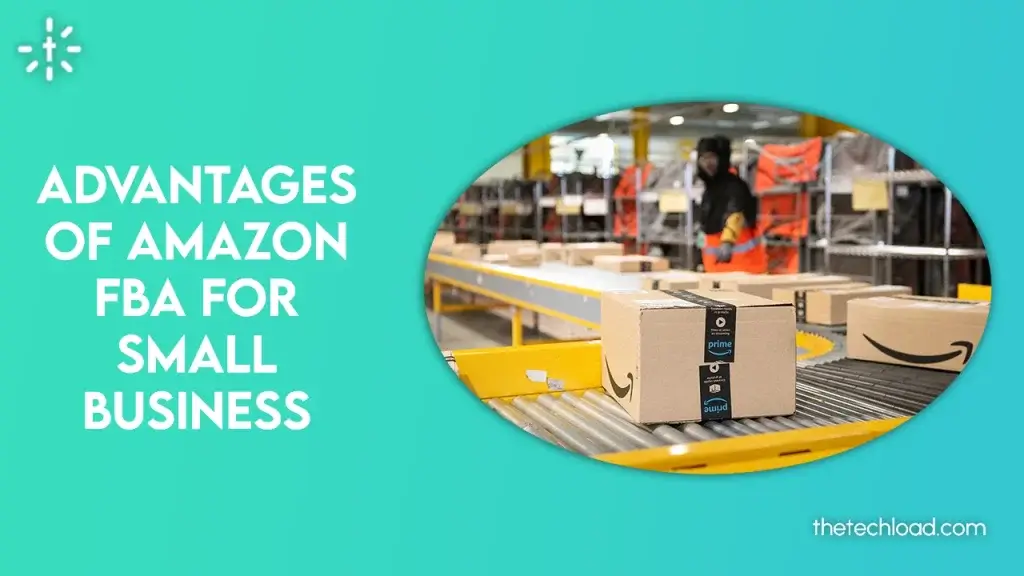Running a small business can be challenging, especially when it comes to handling logistics and expanding your market reach. With over 150 million Prime members, Amazon offers a massive potential customer base. However, setting up shop on Amazon isn’t always straightforward. This is where Amazon FBA for small business comes into play.
Amazon FBA (Fulfillment by Amazon) takes care of storage, packaging, and shipping for you. This allows you to focus on growing your business. With 89% of buyers preferring Amazon over other sites, using FBA can significantly enhance your reach and efficiency.
But is Amazon FBA the right choice for every small business?
With 1.5 million active sellers on Amazon, making this decision can be complex. The types of products you sell and your stock levels are important factors to consider. To find out more about how Amazon FBA can benefit your small business, keep reading.
What is Fulfillment by Amazon (FBA)?
Amazon’s FBA (Fulfillment by Amazon) model is a service where Amazon takes care of storage, packaging, and shipping for sellers. When you use Amazon FBA, you send your products to Amazon’s fulfillment centers, and Amazon handles the rest. This includes:
- Storage: Amazon stores your products in its vast network of fulfillment centers.
- Packaging: When an order is placed, Amazon workers pick and pack the item.
- Shipping: Amazon ships the product to the customer, often with the benefit of Prime shipping speeds.
Additionally, Amazon FBA also manages customer service and returns, giving you more time to focus on other aspects of your business. By leveraging Amazon’s FBA model, small businesses can take advantage of Amazon’s logistics network and massive customer base, potentially increasing their sales and customer satisfaction.

Advantages of Amazon FBA for Small Business
Amazon FBA (Fulfillment by Amazon) is a game-changer for small businesses. It provides a streamlined solution for storage, shipping, and customer service, while also granting access to Amazon’s extensive customer base.
Let’s dive into the key benefits of using Amazon FBA for small business operations.
1. Streamlined Logistics with Amazon FBA
One of the foremost advantages of Amazon FBA for small business is the streamlined logistics it offers. Managing inventory and shipping can be complex and time-consuming. However, Amazon takes care of storage, packaging, and shipping.
This allows businesses to focus on other critical aspects of their operations. By leveraging Amazon’s vast logistics network, small businesses can ensure their products reach customers efficiently and reliably.
2. Enhanced Customer Service
Customer service is a critical component of any successful business. With Amazon FBA, small businesses benefit from Amazon’s exceptional customer service team. This team handles customer inquiries, returns, and refunds.
Therefore, businesses can maintain high customer satisfaction levels without the overhead of managing these tasks in-house. Using Amazon FBA for small business operations means entrusting customer interactions to professionals who are experts in maintaining customer satisfaction.
3. Increased Sales Potential
Amazon FBA significantly boosts the sales potential for small businesses. By listing products on Amazon, businesses gain access to millions of customers worldwide. Furthermore, products fulfilled by Amazon are often prioritized in search results and eligible for Amazon Prime.
This enhances product visibility and increases the chances of making a sale. The use of Amazon FBA for small business sales strategies can lead to a notable increase in revenue and growth.
4. Quick Delivery and Reliable Logistics
Amazon is renowned for its quick and reliable delivery services. Small businesses that use Amazon FBA benefit from Amazon’s advanced logistics infrastructure, ensuring that products are delivered to customers swiftly and accurately.
This quick delivery capability not only meets customer expectations but also fosters trust and loyalty. Utilizing Amazon FBA for small business logistics ensures that businesses can compete with larger players by offering the same level of service.
5. Prime and Buy Box Privileges
One of the most significant advantages of using Amazon FBA for small business is gaining access to Prime and Buy Box privileges. Products fulfilled by Amazon are eligible for Prime, which attracts millions of Prime members who prioritize quick and free shipping options.
Additionally, having products eligible for the Buy Box increases their chances of being purchased, as the Buy Box is where Amazon highlights top product options to customers. These privileges can lead to a substantial boost in sales and market presence for small businesses.
The Drawbacks: What Challenges Come with Using FBA?
1. High Costs of FBA Services
Although Amazon FBA offers many benefits, it also comes with significant costs. For starters, you’ll need to pay for a selling plan, which is just the beginning. There’s also a referral fee that ranges from 8-15% of each sale and a fulfillment fee.
Additionally, if you opt for any extra services, those fees can quickly add up. Therefore, using Amazon’s profitability calculator is essential to determine if certain items are worth selling through FBA.
For low-cost goods, it might not make financial sense. Consequently, you may want to consider mixing and matching your inventory. You don’t have to sell all your products through FBA; instead, choose the most profitable ones and handle the others yourself to save on costs.
2. Challenges of a No-Questions-Asked Return Policy
Amazon’s no-questions-asked return policy is another issue. While this policy is great for customers, it often leads to a higher number of returns for sellers. Fortunately, Amazon FBA takes care of returns by managing them directly and sending them back to the warehouse, not to you.
Nevertheless, the increased volume of returns can still be a hassle and affect your bottom line. Thus, it’s crucial to avoid common mistakes like incorrect product descriptions or shipment errors to minimize returns.
3. Strict Product Prepping and Packaging Requirements
Amazon has detailed rules for prepping and packaging your products to ensure smooth operations and a positive customer experience. Before your items reach the fulfillment center, they must be FBA-ready, which means they need to be properly labeled and correctly wrapped.
If you slip up on packaging, it could result in customers getting the wrong items or even receiving unexpected freebies—oops! This can be a major hassle with FBA. To avoid a surge of negative reviews and returns, it’s crucial to follow Amazon’s packaging guidelines carefully.
Tips for Maximizing Success with Amazon FBA: Proven Strategies
Following are the key tips for maximizing success with Amazon FBA.
1. Optimize Product Listings:
Ensure your product listings are well-optimized with relevant keywords, clear descriptions, and high-quality images. Effective Amazon FBA for small businesses relies on attracting customers with compelling listings.
2. Manage Inventory:
Keep track of your inventory levels to avoid running out of stock or overstocking. Effective inventory management is crucial for a successful Amazon FBA for small businesses.
3. Improve Product Photography:
Invest in professional product photography to showcase your products in the best light. Great visuals can significantly enhance your small business.
4. Research Profitable Products:
Conduct thorough research to find products that are both profitable and in demand. This research is vital for a thriving Amazon FBA for small businesses.
5. Choose Products to Sell:
Select products that align with your business goals and market demand. The right product choices can make or break your Amazon FBA for small business.
6. Focus on Customer Reviews:
Actively monitor and respond to customer reviews to build trust and improve your products. Positive reviews can boost your success.
7. Utilize Amazon SEO:
Optimize your product listings with Amazon SEO techniques to improve your visibility and ranking on the platform. Effective Amazon FBA for small business depends on strong search engine optimization.
8. Monitor Amazon Customer Metrics:
Keep an eye on key customer metrics to gauge performance and make data-driven decisions. This is essential for ongoing success with Amazon FBA for small businesses.
9. Build Your Brand:
Develop a strong brand presence to differentiate yourself from competitors and build customer loyalty. A well-established brand can enhance your Amazon FBA for small business.
10. Grow a Successful Amazon FBA Business:
Continuously refine your strategies and adapt to changes to foster growth and success in your Amazon FBA for small businesses.
11. Identify a Product:
Choose products that have strong market potential and align with consumer needs. Product identification is crucial for a successful Amazon FBA business.
12. Investigate Your Competition:
Analyze your competitors to understand their strategies and find opportunities for differentiation. Knowing your competition is key to succeeding.
13. Leverage Amazon Advertising:
Utilize Amazon’s advertising options to increase visibility and drive sales. Effective advertising is a powerful tool for your Amazon FBA.
14. Prioritize Customer Satisfaction:
Ensure that your customers have a positive experience with your products and service. Customer satisfaction is essential for long-term success with Amazon FBA for small businesses.
15. Refine Your Product Branding:
Continuously improve your product branding to stay relevant and appealing to your target audience. Strong branding supports the success of your Amazon FBA.
16. Sell Small and Lightweight Products:
Consider focusing on small and lightweight items to reduce shipping and storage costs. This can be advantageous for managing an Amazon FBA for small business.
17. Source Products Wisely:
Find reliable suppliers to source high-quality products at competitive prices. Effective sourcing is crucial for a successful Amazon FBA for small business.
18. Stay Compliant with Amazon Policies:
Ensure that you adhere to Amazon’s policies and guidelines to avoid issues and maintain good standing. Compliance is a key factor in the success of your Amazon FB..
19. Win the Buy Box:
Optimize your listings and performance to increase your chances of winning the Buy Box, which can significantly boost your sales. Winning the Buy Box is an important goal for your Amazon FBA for small business.
By following these tips, you can enhance your success and growth with Amazon FBA for small business.
Conclusion
Amazon FBA for small business offers a powerful solution to streamline logistics and enhance growth. By outsourcing storage, packaging, and shipping to Amazon, small businesses can tap into a vast customer base, enjoy Prime shipping benefits, and focus more on scaling their operations.
While there are costs and specific requirements to consider, the advantages of increased visibility, efficient fulfillment, and superior customer service make Amazon FBA a valuable tool for many small businesses. Embracing Amazon FBA can help small businesses reach new heights and achieve greater success in the competitive e-commerce landscape.
For more insights and resources on optimizing your e-commerce strategy, visit our website at TheTechLoad. At TheTechLoad, we provide expert tips and comprehensive guides to help you make the most of Amazon FBA and other business solutions.
FAQs
Amazon FBA handles storage, packaging, and shipping, allowing small businesses to scale quickly.
Amazon FBA charges for storage and fulfillment, which vary based on the size and weight of your products.
You can use your own packaging as long as it meets Amazon’s requirements for FBA.
Use the Amazon Seller Central dashboard to monitor your inventory levels and sales performance.
Amazon FBA provides access to Amazon’s vast customer base and offers reliable shipping and customer service.






One Response